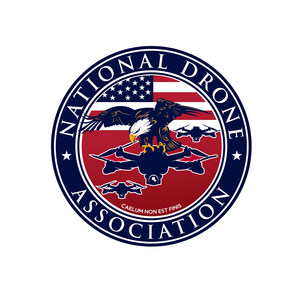WASHINGTON, Dec. 9, 2024 /PRNewswire/ -- Following the release of the final text of the FY 2025 National Defense Authorization Act (NDAA), Nathan Ecelbarger, spokesman for the provisional Board of Directors for the United States National Drone Association (USNDA), issued the following statement:
"USNDA commends U.S. Senator Rick Scott (FL) and U.S. Congresswoman Elise Stefanik (NY), along with the leadership of the House and Senate Armed Services Committees, for their dedication to advancing the FY 2025 NDAA, which includes numerous provisions aimed at crippling China's drone dominance in U.S. markets and accelerating the integration of secure uncrewed systems, robotics, and autonomy across the U.S. Department of Defense (DOD)."
- The FY25 NDAA requires the FCC to list all technology manufactured by DJI, Autel Robotics, and their subsidiary and affiliated companies on their Covered List within a year of enactment of the legislation unless a national security agency determines they do not pose a risk to the United States. Once DJI, Autel Robotics, and their subsidiaries are placed on FCC's Covered List, new models of their drones will be prohibited from operating on U.S. communications infrastructure and will therefore not be able to be imported into the United States. These provisions will enhance U.S. national security and build domestic drone manufacturing.
- Additionally, the FY25 NDAA requires the DoD to increase the resiliency of sUAS supply chains by working with industry to grow domestic manufacturing of sUAS components. The DoD is required to develop a Resilient Supply Chain Strategy specifically for domestically manufactured small drones.
(Sections 162, 229, 353, 865, 925, 1031, 1073, 1078, 1089, and 1090, 1323, 1709)
"While emerging drone technology continues to globally change the character of warfare and demonstrate critical security vulnerabilities across national security and defense spectrums, swift and coordinated actions must be taken to replace the pervasive monopoly of China's drone technology with an American drone industrial base. Simply put, regardless of security or supply chain concerns addressed in the 2025 NDAA, allowing Chinese drones flying in American skies represents an unnecessary and reversible risk.
The United States has allowed China to dominate the global and national consumer market, and line the shelves of department stores with potential miniature Weapons of Mass Destruction (mWMD's). The 2025 NDAA is a step towards eliminating China's drone supply chain, but not the only step.
Hard work remains that requires Congress to work across numerous Committees, the Federal Communications Commission and Federal Aviation Administration, to critically examine national security postures and regulations. After the attacks on 9/11 in 2001 the FAA had the capability of grounding all flights nationally. No such capability exists today should drones be used in the next coordinated terror attack.
Congress must continue the forward momentum of the 2025 NDAA to take a first principles approach to rebuild a U.S. drone industrial base from the ground up, that not only removes China's dominance, but replaces DJI with commercial and consumer drone, drone swarm, and counter technology that can be rapidly and responsibly secured as drones become more pervasive within multiple market sectors. Humble, holistic, coordinated action is essential to maintain the safety and security of the Nation."
The USNDA recommends the next steps for strengthening U.S. Drone Competitiveness:
- Congressional establishment of a joint subcommittee to examine end to end existing and emerging drone technology, that weighs its proliferation both for the promising benefit or potential harm to the nation. Congress should carefully consider how to rapidly and responsibly accelerate or restrain the U.S. drone industry through both subsidization to American drone companies and applicable regulation of their use across markets.
- Establishment of a cabinet-level working group with directed tasking to both represent, and oversee the immediate implementation of, immediate policy or structural changes required within the Departments of Defense, Commerce, Education, Energy, Attorney General, and National Security Advisor, with recommendations accelerated with Executive Orders.
- Establishment of provisional Deputy or Under Secretary roles within respective departments, staffed with appointees from the "professionally impatient" cadre of technical subject matter experts closest to the problem. Specifically to the DoD, the Defense Innovation Unit's BlueUAS program should be recycled, not refreshed, and instead expanded into a larger framework that assists with vetting and on-ramping American drone companies across all of government.
- Establishment of an independent, non-government, not for profit research and development firm that will honestly and openly challenge assertions made by the above through objective experimentation and scenario specific wargaming.
The USNDA will continue to press for transparent and urgent progress through the following three focus areas in 2025:
- The National Drone Games; Following the U.S. Navy Chief Technology Officer's 2024 Memo calling for increased use of structured academic challenges, the USNDA will host a national student challenge awarding scholarships and cash prizes for collaborative academic innovation, with focus areas ranging from concepts and components, to prototypes that demonstrate the art of the possible solving real world problems.
- DroneWERX: A national arena and proving ground, demonstrating current commercial technologies against emerging prototyped innovation, to accelerate adoption at the speed of relevance.
- The National Drone Wars; A national, closed arena that disrupts tactical complacency with earnest transparency, that allows emerging drone technology to present both uncomfortable truths about vulnerabilities, and promising potential that can help accelerate and strengthen the defense, safety, and security of the nation.
- In addition to these three events, the USNDA will also conduct an independent, non-sponsored vulnerability assessment of critical infrastructures against existing, commercially available drone technology and tactics. The findings and recommendations will be released in early 2025.
The USNDA does not primarily represent the drone industry itself, or any drone or component companies. The USNDA's all volunteer cadre of National Security and Defense active, reserve, and retired professionals represent the growing concern over the clear and present vulnerabilities in our national posture towards the nefarious use of drones, both those manufactured in adversary countries and otherwise. The USNDA will continue to advocate for the United States government's role in securing drone technology, while working independently to fill gaps in existing policy through transparency and cooperation between industry, academia, government, and international partners.
About the USNDA:
The USNDA is a 501(c)3 non-profit collaboration consolidating multiple stakeholding industries and partners with shared interest and concern in emerging drone applications ranging from humanitarian aid, public safety, and environmental protection, to national security and defense. Formed by an initial provisional committee, the formal Board of Directors will be announced in the Spring of 2025.
Press and media inquiries can be sent to [email protected]
SOURCE United States National Drone Association

WANT YOUR COMPANY'S NEWS FEATURED ON PRNEWSWIRE.COM?
Newsrooms &
Influencers
Digital Media
Outlets
Journalists
Opted In





Share this article